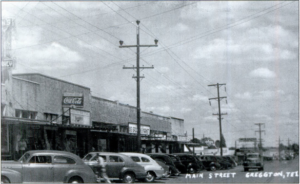Greggton

Greggton, an unincorporated community in Gregg County, Texas, holds a captivating history that traces back to 1873. Originally known as “Willow Springs,” it emerged as a significant stop along the Texas and Pacific Railway. The establishment of U.S. Highway 80 in 1926 further solidified Greggton‘s presence as a pivotal thoroughfare in the region.
The early 1930s witnessed the East Texas Oil Boom, which brought remarkable growth and prosperity to Greggton. The community flourished, and in November 1932, it obtained its own post office, leading to a name change to “Greggton” around the same time. Within just a few years, the population skyrocketed from 180 in 1920 to an impressive 1,500 by 1936, accompanied by the establishment of 125 businesses. The town’s allure continued to attract new residents, resulting in a population surge to 2,350 by 1949.
The vibrant 1950s saw Greggton embracing modern entertainment, with its very own movie theater, “The Ritz,” becoming a popular gathering spot for locals.
In a significant turn of events, Greggton’s journey as an independent community intertwined with that of Longview. The town’s annexation to Longview took place in December 1959, and postal services were officially transferred on May 31, 1960. This amalgamation brought together two distinct histories and cultures, shaping the future of the newly unified region.
Today, Greggton’s legacy continues to thrive through the Pine Tree Independent School District, which now serves the areas of Longview that were once part of Greggton. This lasting influence serves as a testament to Greggton’s historical significance and its contribution to the vibrant tapestry of East Texas.
As a community that evolved from a humble railway stop to a thriving hub during the East Texas Oil Boom, Greggton’s heritage remains alive in the collective memory of the region. Its journey of growth, transformation, and integration into Longview showcases the resilient spirit of the community and its enduring impact on the area’s history and development.
Next Neighborhood: Spring Hill

